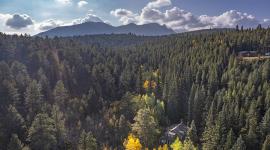Some Rehabilitation Efforts Begin at Dabney Hill, a Texas Freedom Colony
Located in Burleson County, Texas, Dabney Hill is an example of a Texas Freedom Colony that still has an active, living community and whose historic vernacular landscape retains a legible community core despite suffering severe storm damage in 2018. Featured in The Cultural Landscape Foundation’s (TCLF) thematic report and digital exhibition, Landslide 2021: Race and Space, the visibility of the extant Freedom Colony has continued to increase in recent years with the installation of a historical marker and efforts to rehabilitate the community’s Masonic hall.
Following the end of the Civil War, African Americans in the South faced social, political, and economic oppression even after the adoption of the Reconstruction Amendments (thirteenth, fourteenth, and fifteenth) to the U.S. Constitution. To avoid becoming involved in the perilous conditions of sharecropping or debt bondage, some formerly enslaved people organized to accumulate land and form intentional, self-sustaining communities separate from white society. Many of these communities emerged throughout the South in the Reconstruction era, and in Texas, they became known as Freedom Colonies.

Founded in 1887 by Daniel Dabney, Dabney Hill covers approximately 50 acres and is representative of most Freedom Colonies: a rural, agrarian cluster of homesteads anchored by a church and cemetery, a Lodge Hall (ca. 1910), and a school (Jones School). The segregated Jones School drew African American students from Dabney Hill and several nearby Freedom Colonies but was shuttered at the onset of integration and later demolished, though the ruins of the school gymnasium remain on the property.
The half-acre property of the Dabney Hill Missionary Baptist Church hosted many gatherings, formal and informal, and served the spiritual and social needs of the community. The Lodge Hall (Ethiopian Star Lodge #308) provided a gathering place and offered rest and shelter to visiting preachers and other African American travelers who were prevented from staying in area hotels by segregation and restrictive laws. Dabney Hill Missionary Baptist Church and the Hall remain in situ within this cultural landscape, though they have suffered damage and neglect. Some descendants maintain homes nearby, and the church is still home to an active congregation.
In 2016 Fort Worth, Texas native, Gloria Smith, discovered that her ancestor, George Duffy, acquired 170 acres in the Dabney Hill community in 1882. Guided in part by Dr. Andrea Roberts, Smith has since worked to raise the visibility of her “down home” community. She advocated for the creation of an interpretive roadside marker to commemorate the Freedom Colony (approved by the Texas Historical Commission in 2020) and sat for an interview with TCLF in 2021 (featured below).
In February 2023, after delays caused by the coronavirus pandemic, Smith and Burleson County Judge Keith Schroeder unveiled the permanent interpretive plaque along Country Road 265 in Snook, Texas. Commemorating Black History Month and the Dabney Hill Freedom Colony, the ceremony was attended by members of the Burleson County Historical Commission and Smith’s relatives, who collectively sung “Lift Every Voice and Sing,” often referred to as the Black National Anthem.

In February 2024 the Rural African-American Heritage Grants Program of the non-profit Preservation Texas awarded $75,000 to the Dabney Hill Lodge Hall to fund critical stabilization and weatherproofing. Rehabilitation of the hall will be led by architect Donna Carter of Carter Design Associate, who reflected on the community: “People got married here. Babies were born here. People loved here…It’s not just struggle. It’s not just slavery. Those are important and we need to remember but there were, there were good times as well.”

In Spring 2024, the non-profit Texas Historical Foundation awarded $5,000 to the Dabney Hill Missionary Baptist Church to support the nomination of the structure to the National Register of Historic Places. Advocates want to see the entie Dabney Hill community listed in the National Register to further safeguard this Freedom Colony’s cultural landscape legacy.




